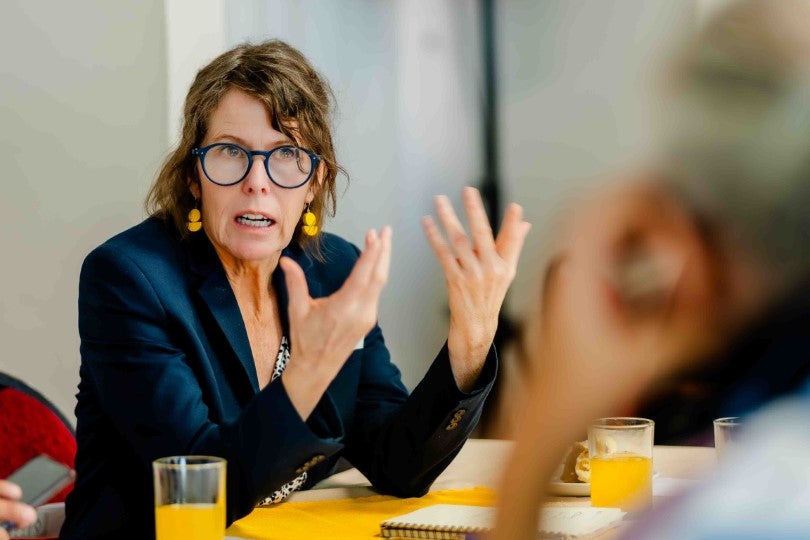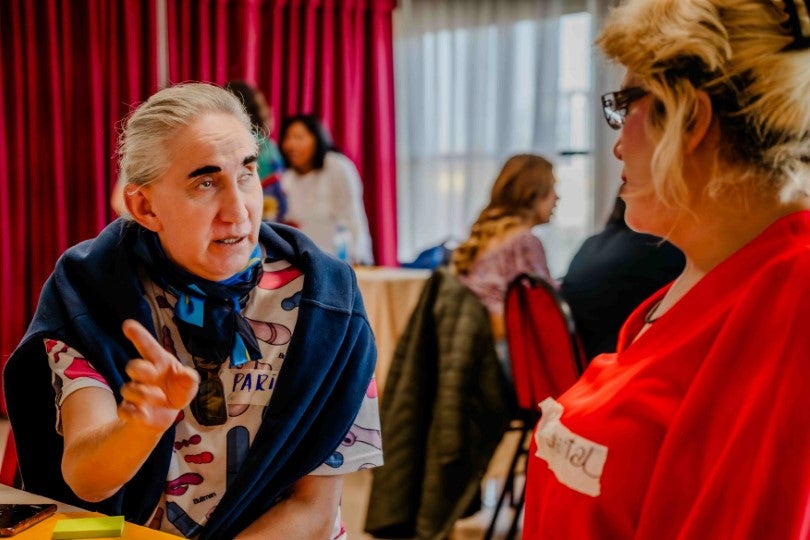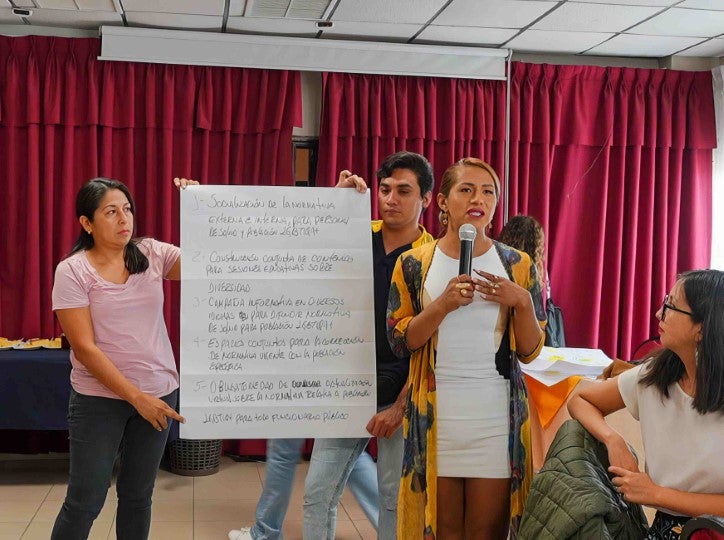
La Paz, December 12, 2024 (PAHO) - A joint 2025 agenda was agreed upon a horizontal dialogue between the Ministry of Health and Sports (MSyD) and LGBTIQ+ collectives in Bolivia to advance towards a more inclusive and equitable health system. This process was supported by the Government of Canada and the Pan American Health Organization/World Health Organization (PAHO/WHO).
As part of a workshop organized by the Ministry of Health and Sports, under the leadership of the Directorate General of Health Promotion and Prevention, a team of Bolivian professionals led by Director General Mayra Neyrot, with support from PAHO’s Regional Gender and Health Advisor, Aysa Saleh-Ramirez, Regional Health Equity Advisor, Ana Ortigoza, and the national consultant on Gender and Interculturality in Bolivia, Bertha Pooley, held a horizontal dialogue with representatives from over 20 LGBTIQ+ organizations. The discussions were guided by a methodology analyzing intersectionalities within diverse populations.
The workshop was held over two days. On the first day, the goal was to identify health and social protection inequalities experienced by LGBTIQ+ representatives through a participatory process. The Intersectional Analysis Methodology facilitated the identification of the most affected populations and existing inequalities from the perspective of LGBTIQ+ populations. It also helped prioritize health needs and generate recommendations based on participants' perspectives.
When identifying health inequalities, Sole Patty, a workshop participant, explained: "Discrimination and exclusion are more evident because there are mechanisms (care protocols) that are not adapted to the reality experienced by the LGBTIQ+ population. The stereotypical standards of how a person is supposed to look greatly influence the care provided and the subjectivity of healthcare staff. This leads to discriminatory processes because what is seen determines what is said. When this does not align with the legal document or the medical information in the file or care portfolio, poor-quality care can result. Beyond this, the country is not prepared to provide specialized care for the new or specific requirements that exist within the LGBTIQ+ population."
Laurie Rogers, Head of Cooperation at the Canadian Embassy in Bolivia, stated: “Canada's support to Bolivia is guided by its Feminist International Assistance Policy. Human dignity, along with support for health, sexual and reproductive rights, are integral parts of this strategy, including the rights of marginalized and socially disadvantaged groups and the promotion of LGBTQ2+ rights and access to services.”
Among the key findings identified by the Ministry of Health and Sports and the LGBTIQ+ community members were persistent patterns of stigma and discrimination within health services. Naimath, a representative of one group, said: “Many times, because of the stigma associated with being part of a sexually and gender-diverse population, healthcare personnel do not want to attend to you, stigmatizing us with the idea that all LGBTIQ+ people have HIV.”
Other findings included a limited number of services sensitive to the needs of LGBTIQ+ individuals, which are often centralized and primarily focused on the prevention and treatment of HIV and STIs rather than addressing broader health needs. Additionally, there is insufficient availability of policies, protocols, and comprehensive care standards that consider the diversity and specific needs of each LGBTIQ+ group.
On the second day, participants identified barriers and enabling factors related to the availability of geographically disaggregated data and the inclusion of data on gender, ethnicity, social class, and other social determinants in health information systems. This would allow for better visibility of health inequities and specific needs in program and intervention design. Discussions also focused on the need for technical recommendations on conceptual, methodological, and logistical aspects of territorial disaggregation and the integration of gender data in health information systems.
The workshop recommendations focused on commitments to training clinical and administrative healthcare personnel on health for LGBTIQ+ populations, combating stigma and discrimination within health services by updating and disseminating national regulations, reducing gaps in the enforcement of anti-discrimination laws, and developing care protocols that address the specific needs of the LGBTIQ+ population while ensuring the availability of disaggregated data.
Paris Galán, an activist and member of the TLGB Bolivia Collective, added: “I hope we can use this initiative to promote substantial improvements in the health system, such as incorporating a comprehensive health plan for young gay men, young lesbians, elderly gay men, health programs for transgender women, and improving the multisectoral HIV care strategy and plan.”
Director General of Health Promotion and Prevention, Maya Neyrot, explained that the Bolivian government is working through the Universal Health System (SUS) to ensure access to healthcare for all Bolivians. “Indeed, gaps still persist for Indigenous and LGBTIQ+ populations,” she acknowledged.
Neyrot concluded: “…we are working on an agenda that focuses on health promotion and prevention. Simply treating illnesses will not resolve the country's health issues. If we emphasize health promotion and prevention within these collectives, we can achieve longer-term results.” She also highlighted the need for educational sessions to raise awareness among the population and healthcare staff.






